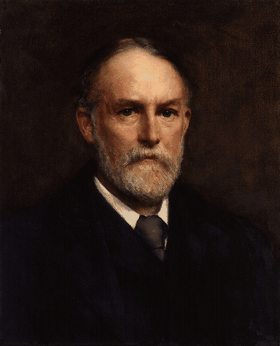When psychology students study the history of their discipline, there is often a curious omission in what they are taught. Very few mentions are ever made of a man known as Frederic W. H. Myers. Myers was a close and dear friend of William James, who most psychology students do know about and whose influential book, "Principles of Psychology," earned him the right to be called the "Father of American Psychology." James and Myers shared many interests, and influenced each other’s work in psychology and other disciplines to a great degree. So why is Myers rarely even a footnote?
A lot of it has to do with Myers ‘and James’ shared interest in the area of psychical research. Myers was one of the founders of the Society for Psychical Research (SPR), and James once served as the SPR’s president. This fact about James is often left out of psychology textbooks, which prefer to focus on his functionalism, pragmatism, and empiricism. While James’ work in these other areas appeals to the scientific minds of today, Myers devoted himself entirely to a study of psychology routed in psychical research, and is therefore more easily written off.
Throughout his life, Myers was intensely interested in phenomena such as the collective unconscious, the subliminal self, the existence of non-material, dream-like worlds, telepathy, hallucinations, apparitions, and a variety of psychological experiences that he believed were not well-accounted for in materialistic science. He was also interested in the relationship between the mind and the body, and particularly in what happens to human consciousness after death.
 Myers’ greatest work was a 1,360 page, two-volume book titled "Human Personality and Its Survival of Bodily Death," published after Myers’ own death in 1903. Though the book’s main theme is nicely presented in the title, "Human Personality" was about much more than the afterlife, and was in fact very much focused on the psychological life of living, breathing humans being. It was a deep exploration of all of Myers’ ideas concerning the nature of the unconscious mind. It touched on the topics of personality, genius, sleep, hypnotism, sensory automatism, phantasms, motor automatism, trance, possession, and ecstasy.
Myers’ greatest work was a 1,360 page, two-volume book titled "Human Personality and Its Survival of Bodily Death," published after Myers’ own death in 1903. Though the book’s main theme is nicely presented in the title, "Human Personality" was about much more than the afterlife, and was in fact very much focused on the psychological life of living, breathing humans being. It was a deep exploration of all of Myers’ ideas concerning the nature of the unconscious mind. It touched on the topics of personality, genius, sleep, hypnotism, sensory automatism, phantasms, motor automatism, trance, possession, and ecstasy.
William James once remarked, in an essay entitled, "Frederic Myers’s Service to Psychology," that it was through Myers that psychologists were, for the very first time, "in possession of their full material." The fact that later generations of psychologists don’t seem to have agreed with this statement is unfortunate.
There is no doubt that Myers’ fascination with and the study of psychic phenomena is clearly the reason he was pushed out of main stream scientific memory. As mentioned, Myers was one of the founders of the Society for Psychical Research and he would often argue that even though some psychics and clairvoyants who were tested had been caught ‘cheating’, not all psychic phenomenon should be dismissed nor all clairvoyants branded as fraud.
Myer’s was highly educated. He graduated Cheltenham and Trinity College, Cambridge, where he won a long list of honors. Myer’s ideas were no more radical and counter-intuitive to our modern, rational, empirical understanding than the ideas of Carl Jung, for example. While most psychologists do not consider themselves to be of a Jungian orientation, they nevertheless acknowledge his contributions to the field of psychology while failing to do the same for Myers, who, incidentally, was one of Jung’s main influences.
Perhaps Myers will one day take his rightful place in the psychology history books, but, if not, his ideas will live on in the works of some of psychology’s most influential thinkers.
Interested in a psychic reading yourself? Give Psychic Alex a call at 1-866-327-9032, toll free USA and Canada.

